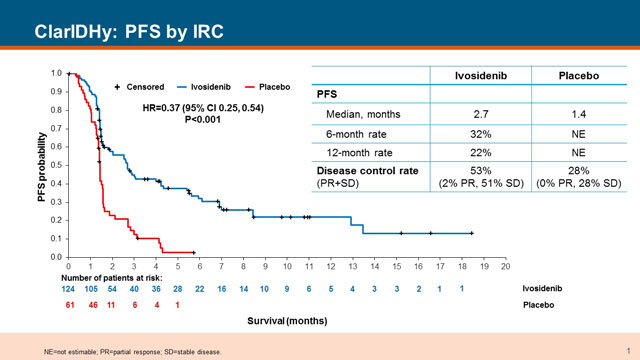Patients with advanced cholangiocarcinoma and an isocitrate dehydrogenase 1 (IDH1) mutation showed clinical benefit and improved progression-free survival (PFS) with ivosidenib compared to placebo, according to pivotal phase III trial results presented at the ESMO Congress 2019 in Barcelona, Spain.
Ghassan K. Abou-Alfa, Memorial Sloan-Kettering Cancer Centre in New York, United States of America, who presented the study results, explained the rationale behind the phase III, randomised, global, double-blind ClarIDHy (NCT02989857) study of ivosidenib versus placebo in patients with advanced cholangiocarcinoma and IDH1 mutation.
According to Prof. Abou-Alfa, ivosidenib (AG-120) is a first-in-class, oral, small-molecule inhibitor of the mutant IDH1 protein, which participates in the production of the ontogenesis promoting oncometabolite, D-2-hydroxyglutarate (2-HG). IDH1 mutation has an incidence of up to approximately 15% of patients with cholangiocarcinoma, which is a rare cancer having few effective therapies.
ClarIDHy enrolled 185 patients with advanced cholangiocarcinoma and IDH1 mutation who were randomly assigned 2:1 to ivosidenib at 500 mg once daily or matched placebo and stratified by the number of prior systemic therapies (1 versus 2). The patients had a median age of 62 years, 117 were female, and 91% had intrahepatic disease. All patients had advanced unresectable cholangiocarcinoma and IDH1 mutation based on central testing, ECOG performance status 0–1, and measurable disease per RECIST v1.1. Overall, 92% of patients had metastatic disease, and 43% had received 2 prior therapies.
The primary endpoint was PFS by central review and secondary endpoints included safety, objective response rate (ORR), PFS by local investigator review, and overall survival (OS) in the intent-to-treat population (ITT). Crossover from placebo to ivosidenib was permitted upon radiographic disease progression (PD) and the crossover-adjusted OS was derived using rank preserved structural failure time (RPSFT).
The study primary endpoint of PFS by central review was met
Ivosidenib improved PFS over placebo; median PFS was 2.7 months in the 124 patients treated with ivosidenib compared to 1.4 months in the 61 patients receiving placebo (hazard ratio [HR] 0.37; 95% confidence interval [CI], 0.25, 0.54; p < 0.001). The 6- and 12-month PFS rates were 32.0% and 21.9% with ivosidenib; however, no patients on placebo were progression-free for 6 months or more at data cut-off.
The ORR for ivosidenib was 2.4%, which consisted of 3 partial responses, and 63 patients (50.8%) achieved stable disease (SD). With placebo, the ORR was 0% and 27.9% (17 patients) achieved SD.
According to the ITT analysis, median OS was 10.8 months with ivosidenib compared to 9.7 months with placebo (HR 0.69; one-sided p = 0.06) with 57% crossover from placebo. Therefore, the RPSFT-adjusted median OS was 6 months with placebo (HR 0.46; p = 0.0008). PFS by local review (HR 0.47; p < 0.001).
Treatment-related adverse events (AEs) occurring in more than 15% of patients on ivosidenib included nausea (32.1%), diarrhoea (28.8%), fatigue (23.7%), cough (19.2%), abdominal pain (18.6%), ascites (18.6%), decreased appetite (17.3%), anaemia (16.0%), and vomiting (16.0%). Grade ≥3 AEs were reported in 46% of ivosidenib patients compared to 36% of patients on placebo. No treatment-related deaths occurred.
Conclusions
According to the authors, ivosidenib provided significant improvement in PFS and a trend towards favourable OS compared to placebo in patients with advanced cholangiocarcinoma and an IDH1 mutation. This is the first, pivotal study demonstrating the clinical benefit of targeting IDH1 mutation in this patient population.
Disclosure
This study was funded by Agios Pharmaceuticals, Inc.
Reference
LBA10_PR – Abou-Alfa GK, Macarulla Mercade T, Javle M, et al. ClarIDHy: A global, phase 3, randomized, double-blind study of ivosidenib (IVO) vs placebo in patients with advanced cholangiocarcinoma (CC) with an isocitrate dehydrogenase 1 (IDH1) mutation.

